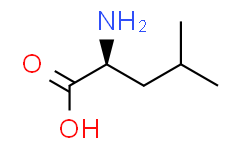


| 中文名称 |
L-Leucine.
|
||||||||||||
|---|---|---|---|---|---|---|---|---|---|---|---|---|---|
| 中文别名 |
L-亮氨酸;L-白氨酸;L-2-氨基-4-甲基戊酸;L-亮氨酸(白氨酸);CultureSure L-亮氨酸,无动物源成分;L-Leucine L-亮氨酸;L亮氨酸;L-亮氨酸 (白氨酸);L-亮氨酸 (食品级)(CP2010);L-亮氨酸 L-Leucine;L-亮氨酸 USP标准品;L-亮氨酸(RG);L-亮氨酸(标准品);L-亮氨酸标准品;L-亮氨酸对照品;L-亮胺酸;亮氨酸;亮氨酸 EP标准品;(S)-2-氨基-4-甲基戊酸;2-氨基-4-甲基戊酸;L-α-氨基异丁;L-α-氨基异丁基醋酸;L-α-氨基异己酸;L-白氨酸,L-闪白氨基酸,氨基异己酸;L-高氨酸;L-闪白氨基酸;α-氨基-γ-甲基戊酸;α-氨基异己酸;氨基异己酸;白氨酸;白氨酸 标准品
|
||||||||||||
| 英文名称 |
Leucine
|
||||||||||||
| 英文别名 |
L-Leucine;(S)-2-Amino-4-methylpentanoic acid;H-Leu-OH;L-Leu;L(+)LEUCINE;LEUCINE, L-(P);LEUCINE, L-(RG);(L)-leucine;(S)-(+)-leucine;(S)-2-amino-4-methyl-pentanoic acid;[14C]-L-(+)-Leucine;[14C]-L-Glutamic acid;[3H]-L-Glutamic acid;Aciglut;GLU;Glusate;GLUTACID;glutamic;Glutaton;H-GLU-OH;H-L-GLU-OH;L-(+)-glutamic acid;L-2-AMino-4-Methylpentanoic acid;L-GLU;L-α-AMinoisobutylacetic acid;L-α-AMino-γ-Methylvaleric acid;amino acid;leucine;(S)-Leucine;(2S)-2-amino-4-methylpentanoic acid;Leucin;L-Norvaline, 4-methyl-;(S)-2-Amino-4-methylvaleric acid;L-leucin;L-alpha-Aminoisocaproic acid;Leucin [German];LEUCINE, L-;Leucine (VAN);leu;Leucinum;(2S)-alpha-leucine;L-(+)-Leucine;L-(-)-2-Amino-4-methylpentanoic acid;Leucinum [INN-Latin];2-amino-4-methylvaleric acid;Leucine [USAN:INN];L-Leuzin;Leucina [INN-Spanish];Leucina [Latin,Spanish];alpha-Aminoisoca
|
||||||||||||
| Cas No. |
61-90-5
|
||||||||||||
| 分子式 |
C6NO2H13
|
||||||||||||
| 分子量 |
131.17
|
||||||||||||
| 包装储存 |
|
||||||||||||
| 详情描述 |
L-Leucine 是一种必需的支链氨基酸 (BCAA),可激活 mTOR 信号通路。 |
| 生物活性 |
L-Leucine is an essential branched-chain amino acid (BCAA), which activates the mTOR signaling pathway. |
||||||||||||
|---|---|---|---|---|---|---|---|---|---|---|---|---|---|
| 性状 |
Solid |
||||||||||||
| IC50 & Target[1][2] |
|
||||||||||||
| 体外研究(In Vitro) |
L-Leucine (10 mM) treatment impairs endocrine progenitor cell development. Medlife has not independently confirmed the accuracy of these methods. They are for reference only. |
||||||||||||
| 体内研究(In Vivo) |
L-Leucine (24 g/kg diet) combined with Resveratrol (12.5 mg/kg diet) to diet-induced obese (DIO) mice increases adipose Sirt1 activity. Medlife has not independently confirmed the accuracy of these methods. They are for reference only.
|
||||||||||||
| 运输条件 |
Room temperature or refrigerated transportation. |
||||||||||||
| 储存方式 |
|
||||||||||||
| ClinicalTrial |
|
||||||||||||
| 结构分类 | |||||||||||||
| 来源 | |||||||||||||
| 参考文献 |
|
| 溶解度数据 |
体外研究:
H2O : 8.33 mg/mL (63.51 mM; Need ultrasonic) 配制储备溶液
*
产品不同,其溶解度不同。建议根据产品选择合适的溶剂配制储备溶液;配成溶液后,建议分装保存,避免反复冻融造成的产品失效。 体内研究:
建议根据您的实验动物和给药方式选择适当的溶解方案。以下溶解方案都建议先按照 体外研究 方式配制澄清的储备液,再依次添加助溶剂:
——为保证实验结果的可靠性,澄清的储备液可以根据储存条件,适当保存;体内实验的工作液,建议您现用现配,当天使用;
以下溶剂前显示的百
*
|
|---|
1:一般建议:溶解度为Medlife测试数据,可能与文献描述存在差异。这是由于生产工艺和批次不同产生的正常现象。为了使其更好的溶解,请用37℃加热试管并在超声波水浴中震动片刻。不同批次产品溶解度各有差异,仅做参考,具体以实验方案为准。
2:储存条件:粉末-20°C一般情况可以保存3年,溶于溶剂-80°C一般情况可以保存1年。不同产品及不同批次产品可能存在差异,请细致阅读产品信息,并辅助参考相关文献描述。
Copyright © 2025 陌孚医药 All rights reserved 未经授权禁止拷贝本站所有资料,如有违反,将追究法律责任。
 沪ICP备2023012080号 |
沪ICP备2023012080号 |  沪公网安备31011402010657号
沪公网安备31011402010657号
 扫码关注公众号
扫码关注公众号
